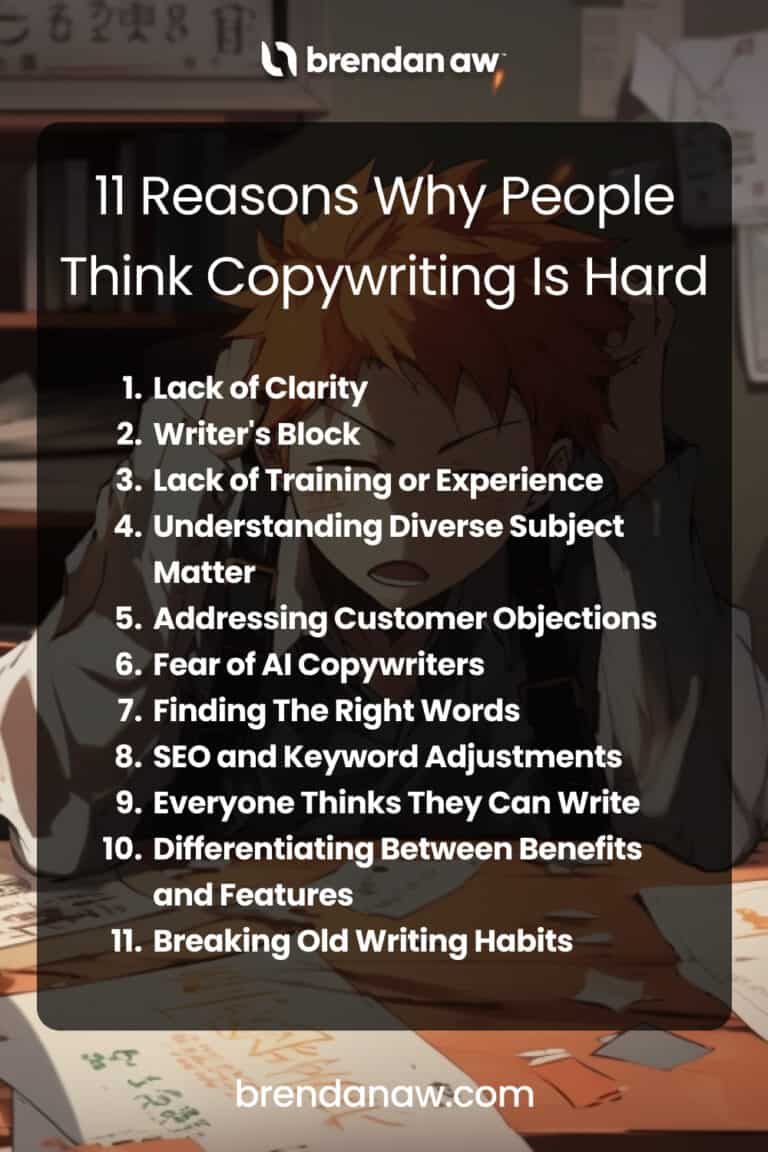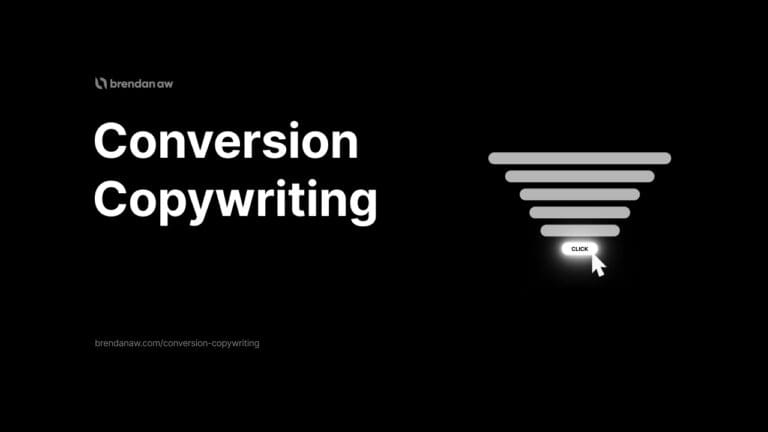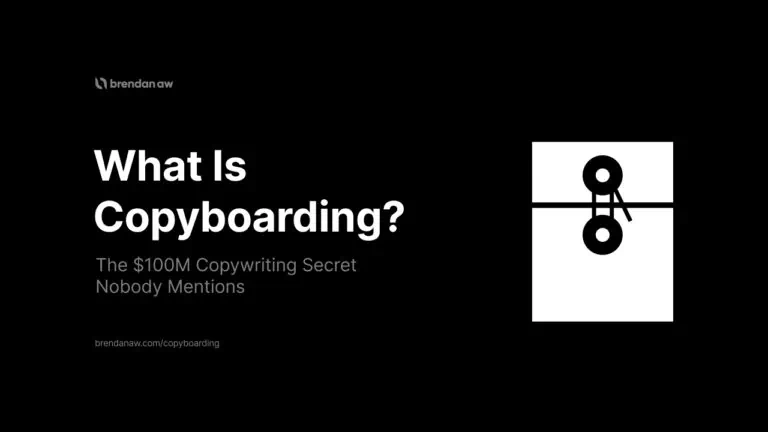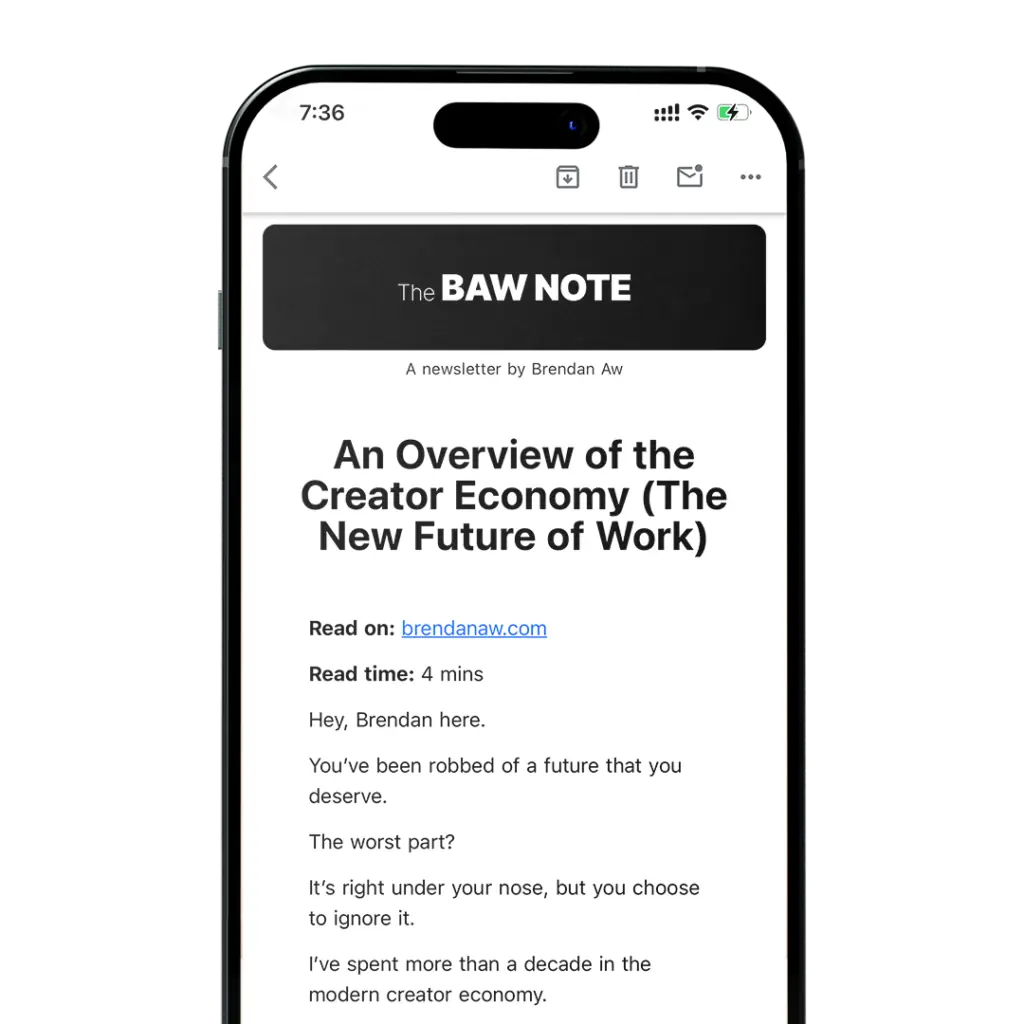No copywriting isn’t hard, but neither is it easy.
Just like any other subject…
It’s hard if you know nothing about it…
And there’s a learning curve.
I would know because my Accounting and Finance degree didn’t help me land my first marketing job.
Teaching myself content creation and copywriting got me hired at one of Singapore’s largest E-commerce smart home brands specializing in paid advertising.
I’ve compiled a list of reasons why others think “Is copywriting hard?” based on my own experience…
While also giving you tips to overcome them to become a proficient copywriter.
- Lack of Clarity
- Writer’s Block
- Lack of Training or Experience
- Understanding Diverse Subject Matter
- Addressing Customer Objections
- Fear of AI Copywriters
- Finding The Right Words
- SEO and Keyword Adjustments
- Everyone Thinks They Can Write
- Differentiating Between Benefits and Features
- Breaking Old Writing Habits
1. Lack of Clarity
Imagine being told, “I want you to write copy that can increase my conversions,” without additional information.
That’s too generic!
This is one of the major reasons why people think copywriting is challenging…
It’s a lack of clarity.
This can stem from vague project briefs and unclear client goals leading to wasted time and frustration.
Anything can be complicated if you don’t have enough information.
Just like learning the skill itself.
Here’s how to overcome it:
- Ensure thorough comprehension: Understand the copy’s goal beyond surface-level instructions.
- Ask questions: If something isn’t clear in the project brief or there are ambiguities regarding client goals, ASK.
- Verify information: Always validate each detail before starting work on drafts.
There is ZERO harm in knowing too much.
2. Writer’s Block
Writer’s block is a common obstacle that even the best copywriters face.
Don’t be ashamed.
- Stress
- Exhaustion
- Feeling swamped
These can all be causes even proficient copywriters.
The key to overcoming this hurdle is finding effective ways to stimulate creativity and relaxation.
I don’t care what you do…
Do anything else aside from writing copy.
Whether through meditation, going to the gym, or nerding out on copywriting books.
You need to clear your mind and reignite inspiration.
3. Lack of Training or Experience
You might feel copywriting is hard to crack without formal training or experience.
This is nonsense.
The reality?
You don’t need an English degree or years spent writing term papers to become proficient in copywriting.
Yes, formal education and prior experience are helpful but not mandatory for success.
As mentioned in the intro…
Did you think my Accounting and Finance degree had anything to do with starting my creator business?
No.
Everything you need to master this skill is on the internet… and on my blog 🙂
4. Understanding Diverse Subject Matter
I’m not gonna sugarcoat it…
Writing copy for new copywriting niches that are new to your knowledge base is tough.
There’s no shortcut.
You need to immerse yourself in the product or industry to learn its nuances and jargon before crafting engaging content.
This involves intensive copywriting research.
5. Addressing Customer Objections
The art of copywriting involves anticipating and addressing potential customer objections.
This involves not only recognizing what the target market desires…
But also their uncertainties and misgivings.
It sounds a whole lot like mind-reading…
Well, because it kinda is.
If you’re selling an expensive product or service, for instance, you’ll likely face cost-related objections from prospective buyers.
As a skilled freelance copywriter, it’s within your power to address this head-on by emphasizing long-term value or unique benefits that justify the price point.
By conducting thorough market research to gain insights into customers’ behavior patterns, they can effectively counter concerns in sales copies.
6. Fear of AI Copywriters
Many think that AI spells doom for human copywriters and it’s too difficult trying to compete with robots.
So they don’t even try.
But here’s the twist…
It can actually be a boon.
AI won’t replace writers. They’re tools designed to help us.
They cannot replicate our creativity or understanding of language nuances…
At least not yet.
And the most important advantage you have as a human is?
Take a guess…
The ability to synthesize new information.
AI copywriters can only reference their training data to create copy that is similar.
Not new but close enough.
Copywriting is a lot more THINKING than actual writing.
It’s about thinking:
- What the customer needs
- What specific jargon to use
- When to say certain things
These nuances can’t be easily replicated by AI copywriting software.
But what happens when you are a good copy-THINKER combined with AI?
You’ll be a cash-generating literary wizard.
7. Finding The Right Words
Copywriting isn’t just writing…
Certain words have a greater effect on influencing readers.
And certain readers respond better to specific words.
Many find difficulty because they:
- Lack the vocabulary
- Don’t understand their audience
It’s as simple as that.
Here’s what should do.
Understand Power Words
Being a good copywriter means understanding which power words trigger emotional responses from readers.
These are often more persuasive than regular language.
It’s an easy fix but just incorporate them in your copy.
Nobody is asking you to memorize the dictionary.
Understand Your Audience
You need an intimate knowledge of who you’re writing for.
By researching their interests, preferred language styles, motivations, and pain points, we can craft relatable material they’ll connect with on multiple levels.
If making money is their primary motivation…
Use more aggressive terms and phrases that demonstrate how using certain services or products leads toward this goal.
Don’t be conservative.
8. SEO and Keyword Adjustments
SEO is a significant part of the copywriter’s journey.
Your ability to write with pen and paper is no longer valuable.
A study back in 2019 showed that over 53% of all site traffic came from organic search.
I’m willing to bet it’s way more now.
Many aspiring copywriters mutter to themselves “Oh sh*t” once they hear “SEO”…
There’s no avoiding it as SEO copywriting is a huge part of online copy.
It’s understandable as it goes beyond merely filling your content with keywords…
You need to know how to write for both search engines and humans.
It’s about balancing keyword usage with natural language and compelling storytelling.
The good news is…
You don’t have to worry too much about SEO for now.
Just master copywriting basics first.
9. Everyone Thinks They Can Write
The perception that anyone can write copy themselves often creates a hurdle because of misguided expectations.
Of course, copywriting is hard when you think it’s easy…
You must understand the difference between general writing and crafting persuasive sales copy.
The former is simply writing coherent sentences that are grammatically correct and error-free.
The latter requires:
- Extensive customer research
- Critical thinking
- Creative sentence structuring
- Understanding of psychology
They ain’t the same…
Throw everything you learned in school into the bin.
That doesn’t work in the real world.
Seasoned content creators specializing in blog writing or promotional material bring significant value by producing unique, high-quality content.
10. Differentiating Between Benefits and Features
This was one of my biggest issues when starting copywriting.
Finding a clear distinction between benefits and features.
And I’m sure many struggle with this.
My problem was assuming one could be inferred from the other.
That may sound obvious and intuitive…
But here’s the difference:
- Feature: What a product or service does
- Benefit: Explains how it enhances the user’s life
Beginners focus more on promoting features without highlighting corresponding benefits.
They somehow think more is better.
And they can’t crack the code.
But that just makes readers go…
“So what?”
Customers are interested in how a product can solve their problems or improve their lives.
Not how fancy it is.
If you’re selling an electric toothbrush…
Don’t just say it has five brushing modes (feature).
Explain how these different modes cater to diverse oral care needs for healthier gums and teeth (benefit).
This perspective shift from simply describing what a product does to showcasing its transformative power often leads to more persuasive writing.
This is essentially what being good at copywriting means.
11. Breaking Old Writing Habits
Transitioning from traditional or academic writing to copywriting after years of school is probably going to be your biggest challenge.
Those habits and “proper” writing techniques have been brunt into your soul.
But good news…
You. Can. Be. Reprogrammed.
(our teachers wouldn’t have approved the above three and this sentence…)
Here are some tips:
- Practice self-awareness: Your first step is understanding your current writing patterns. This could include complex sentence structures, perfect grammar, or impersonal tones more suited to term papers than engaging blog posts or advertising copy.
- Start practicing: Start performing copywriting exercises focused on crafting compelling narratives with clear language that speaks directly to readers’ needs and desires.
- Embrace feedback: Don’t ask your mum. Go out into the wild and start posting on social media platforms like Twitter and watch your engagement. That’s your feedback loop.
Is Copywriting Hard (FAQs)
How Hard Is Copywriting?
The difficulty of copywriting varies based on one’s training, experience, and ability to adapt to different subjects. However, with practice and dedication, it becomes manageable.
What Do Copywriters Struggle With?
Common struggles include writer’s block, lack of clarity from clients about their goals or target audience, dealing with various topics, and addressing customer objections effectively in sales copies.
What Is the Hardest Part of Copywriting?
The hardest part of copywriting is breaking out of the old writing habits that you were taught in school. It’s a totally different skill set that focuses heavily on persuasion.
Is it Worth To Be a Copywriter?
Yes, it’s definitely worth being a copywriter as it can be a highly profitable career and skill. According to PayScale, the average US copywriter’s salary is $57,104 per year.
Many freelance copywriting creators on platforms like X (formerly Twitter) make well over 6-figures. These include names like JK Molina, Dan Koe, Jose Rosado, GrammarHippy, and Justin Welsh.
Copywriting is the foundation of the success of a creator’s business.
To Sum Up
Though copywriting may appear difficult…
It’s not rocket science.
Cliche but practice makes perfect.












